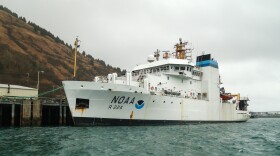-
A portion of the lucrative Bristol Bay red king crab harvest nearly went to waste this season, after a catcher processor that was set to take the crab was forced to shut down.
-
Unalaska is entering the height of its sockeye salmon season, and early numbers from the Iliuliuk weir have shown huge improvements from last year.Over 400 sockeye have been counted as of July 7, surpassing last year’s initial total of just 46 sockeye.
-
With new EU tariffs looming, Alaska seafood leaders look to Trump’s trade deals for support.
-
The U.S. Senate Committee on Commerce, Science and Transportation unanimously passed a seafood bill on April 30 to fight illegal fishing. The legislation would rely on efforts from the National Oceanic and Atmospheric Administration, which Sen. Dan Sullivan said is already struggling to complete key fisheries surveys.Sullivan co-sponsored the Fighting Foreign Illegal Seafood Harvest, or FISH, Act with seven other senators, including Republican Sen. Lisa Murkowski. Sullivan said he hopes it will help fight unfair trade practices and give a boost to Alaska’s fishing industry.
-
Alaska’s top seafood trade groups say new tariffs could trigger retaliation from key export markets, pushing the struggling industry to the brink.
-
A federal judge has ruled that the Trump administration’s mass layoffs of thousands of workers were unlawful.
-
Dunleavy responded to fears over the bill in a video, doubling down on his assertion that it would not open opportunities for salmon farming.
-
The North Pacific Fishery Management Council, which manages federal fisheries off Alaska’s coast, wrapped up its February meeting Tuesday, with one issue dominating discussions: salmon bycatch in the Bering Sea. The 15-member council unanimously approved a motion that inches forward a decision that will finally put to bed the issue of pollock trawlers’ chum salmon bycatch, which has become the biggest fisheries issue in over a decade.
-
-
Silver Bay Seafoods will acquire processing plants in Dillingham and Port Moller, along with fishery support sites in Dillingham and North Naknek. Silver Bay announced the acquisition from Rodger May, the former co-owner of Peter Pan Seafoods, in a press release Wednesday. The Dillingham and Port Moller plants are Silver Bay’s fourth and fifth plant acquisitions this year. It also took over Peter Pan’s plant in Valdez last spring, and Trident Seafoods plants in Ketchikan and False Pass.

Play Live Radio
Next Up:
0:00
0:00
Available On Air Stations









